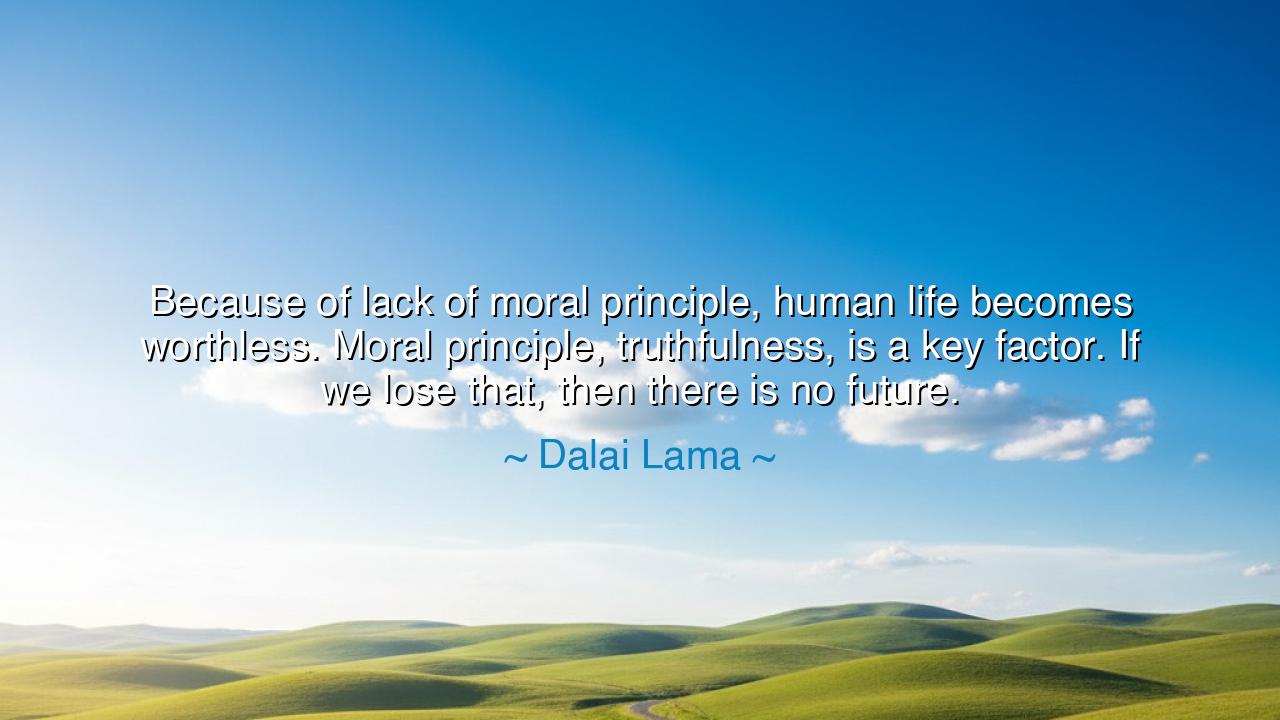
Because of lack of moral principle, human life becomes worthless.
Because of lack of moral principle, human life becomes worthless. Moral principle, truthfulness, is a key factor. If we lose that, then there is no future.






In the profound words of the Dalai Lama, “Because of lack of moral principle, human life becomes worthless. Moral principle, truthfulness, is a key factor. If we lose that, then there is no future,” we are confronted with a truth as old as human civilization itself: that without moral integrity, our lives lose their meaning and purpose. The Dalai Lama speaks to the very foundation of society, where the moral principles we hold shape not only our individual lives but the world we collectively create. If we abandon these principles, we lose our sense of direction, and with it, our future.
This timeless wisdom mirrors the teachings of the ancient philosophers, particularly the Stoics, who believed that virtue was the cornerstone of a meaningful life. Marcus Aurelius, in his meditations, often spoke of the necessity of living according to nature and virtue, understanding that truthfulness, justice, and integrity were the guiding lights of a well-lived life. For the Stoics, moral principle was not optional; it was the very force that aligned human life with nature and cosmic order. They understood that without these principles, life would be adrift, like a ship without a rudder, lost to the whims of fate.
Consider the example of Socrates, who dedicated his life to the pursuit of truth and moral integrity. His commitment to moral principle was so unwavering that, even when faced with the death penalty, he chose to live in accordance with his values, accepting the consequences of his actions rather than compromising his beliefs. Socrates’ life is a testament to the power of truthfulness and the moral courage to speak and act in alignment with one’s principles, regardless of the cost. His legacy has endured not because of his physical achievements, but because he upheld the truth and moral principle, teaching generations that the soul’s integrity is far more valuable than any worldly success.
The moral principle that the Dalai Lama speaks of is not just about adhering to rigid codes of conduct, but about embracing the truth of who we are and our interconnectedness with others. When we lose sight of this truthfulness, society becomes fractured. Wars, corruption, and injustice are often the result of moral decline—when individuals or groups no longer feel bound by ethical principles, and truth becomes relative. The history of Rome’s fall is a poignant example of this. As the empire expanded and became increasingly corrupt, the moral values that had once sustained its growth eroded. The emperors, many of whom ruled through deception and self-interest, contributed to the downfall of what had once been a thriving civilization. It was the loss of moral principle—the abandonment of truth, justice, and integrity—that weakened Rome from within, leading to its eventual collapse.
The future of humanity, as the Dalai Lama warns, is tied to our commitment to moral truth. Without it, we find ourselves in a world where values are arbitrary, and human life becomes a fleeting existence without true purpose. Gandhi, in his leadership for Indian independence, embodied this idea. He believed that the moral truth of non-violence and justice would not only free his people but would also set a moral example for the world. His commitment to truthfulness in the face of overwhelming odds—despite the temptation to compromise for expediency—showed that even in the most challenging of circumstances, a life rooted in moral principle has the power to shape the future.
The lesson from the Dalai Lama's words is clear and urgent: without moral principle, our future is at risk. Truthfulness, in all its forms, is the bedrock of any society that seeks to thrive, evolve, and leave a meaningful legacy. We must remember that individual morality is the reflection of the society we wish to build. As Marcus Aurelius counseled, we must strive to live each day in accordance with virtue, remembering that the actions we take today will have repercussions for generations to come.
In practical terms, we must cultivate moral integrity in our daily lives. This means being honest, acting with compassion, and upholding justice in every interaction. The future is shaped by the choices we make now, and by embracing the moral principles that the Dalai Lama speaks of—truth, kindness, justice—we can help build a world where human life retains its value and purpose. Moral courage is not just about standing up for what is right, but about ensuring that every action we take is rooted in the truth of who we are and what we believe. Let us, therefore, live with integrity and honesty, knowing that these values are the keys to securing a bright future for ourselves and the generations that will follow.






AAdministratorAdministrator
Welcome, honored guests. Please leave a comment, we will respond soon